|
|
|
Sort Order |
|
|
|
Items / Page
|
|
|
|
|
|
|
| Srl | Item |
| 1 |
ID:
153052
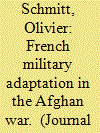

|
|
|
|
|
| Summary/Abstract |
For some, a specific feature of the French armed forces' adaptation process in the adaptation process would be the capacity to look inward instead of outward in order to identify relevant solutions to tactical/doctrinal problems. This article questions such a narrative, and argues that the French armed forces are as quick as any to borrow from other countries’ experiences. In order to do so, this article introduces the concept of ‘selective emulation’, and compares the French and German military adaptation processes in Afghanistan. The article argues that there is indeed something distinctive about French military adaptation, but it is not what the fiercest defenders of the French ‘exceptionalism’ usually account for.
|
|
|
|
|
|
|
|
|
|
|
|
|
|
|
|
| 2 |
ID:
152546
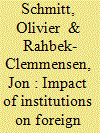

|
|
|
|
|
| Summary/Abstract |
Even though France is an active player on the world stage, its foreign and security think tank milieu is smaller than that of similar powers, most notably the United Kingdom. Comparing French think tanks with those in Denmark illustrates how French institutional structures constrain think tank activities. France’s political tradition of centralisation, its non-academic civil service education, and separation of academia and administration create an environment in which think tanks are underfunded and walk a fine line between an over-controlling administration and a suspicious academia. Some French think tanks perform well in spite of these structures, which indicates that they could flourish and compete at the highest international level if given better structural conditions.
|
|
|
|
|
|
|
|
|
|
|
|
|
|
|
|
| 3 |
ID:
131629
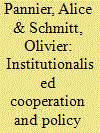

|
|
|
|
|
| Publication |
2014.
|
| Summary/Abstract |
What are the prospects for trilateral concord among Britain, France and Germany in terms of defence policies? Would more institutionalised links among them lead to more convergence of their defence policies? To answer these interrogations, this article investigates the relation between policy convergence and institutionalised cooperation, in particular by studying whether and when one is a prerequisite to the other. First, this article examines the extent to which these countries' defence policies have converged since the end of the cold war based on several indicators: their attitudes towards international forums, their defence budgets, the structure of their armed forces and their willingness to use force. Second, we study each of the bilateral relations between the three states to qualitatively analyse their degree of institutionalisation and the convergence of their defence policies. This article concludes that contrary to the arguments of many discussions, think-tank reports and political actors, there is no evidence that institutionalised cooperation leads to policy convergence as far as defence is concerned.
|
|
|
|
|
|
|
|
|
|
|
|
|
|
|
|
| 4 |
ID:
156551
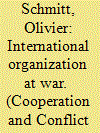

|
|
|
|
|
| Summary/Abstract |
This article investigates the NATO campaign in Afghanistan through a practice-based approach. The structural distribution of power within NATO, which is obviously in favor of the US, does not automatically lead to Washington’s desired outcomes, and US delegates must competently perform a certain number of practices for their power advantage to take its full effect. The article also illustrates how looking at practices helps to explain policy decisions, such as NATO’s decision to engage in Afghanistan, the establishment of an International Security and Assistance Force (ISAF) strategy and the wording of policy papers. By studying a case of military diplomacy, the article contributes to the emerging scholarship aimed at bridging the gap between diplomatic studies and practice-based approaches to International Relations.
|
|
|
|
|
|
|
|
|
|
|
|
|
|
|
|
| 5 |
ID:
166605
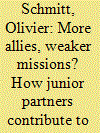

|
|
|
|
|
| Summary/Abstract |
There is a growing consensus that multinational military operations are often less effective than the theoretical sum of their constitutive parts. Multiple chains of command, restriction on intelligence sharing, and capability aggregation problems can reduce fighting power. However, partners may be necessary to provide legitimacy to an intervention. As such, most studies assume that the state leading a coalition (usually the United States) has to accept a degree of operational ineffectiveness in order to gain political benefits from the participation of junior partners to a multinational military operation. However, such analysis puts all junior partners under the same category, without taking into account the differentiated contributions of those junior partners based on their relative military power and international status. This article explores variation between the junior partners’ contributions and their impact on coalition political and military dynamics. It teases out the implications of adopting a fine-grained analysis of junior partners.
|
|
|
|
|
|
|
|
|
|
|
|
|
|
|
|
| 6 |
ID:
186545
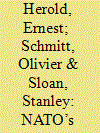

|
|
|
|
|
| Summary/Abstract |
Both China and Russia have become more assertive strategic actors since NATO last revised its Strategic Concept in 2010. What major strategic decisions do Russia, China, and other major powers face in the next decade? How should these changes be reflected in the next Strategic Concept? We argue that NATO must seriously address challenges from China and Russia through increased commitment, preparedness, and coordination of the conventional forces Allies make available. This may require a more integrated, ready, and responsive command headquarters that should be agreed by Allies with the 2022 Strategic Concept and implemented without delay.
|
|
|
|
|
|
|
|
|
|
|
|
|
|
|
|
| 7 |
ID:
153047


|
|
|
|
|
| Summary/Abstract |
This article introduces the key tenets of French foreign and security policy during the Cold War, and illustrates the deep challenges to the French consensus raised by the emergence of a unipolar system. There is a growing gap between the rhetoric of French security policy, emphasizing ‘autonomy’ and ‘sovereignty’ out of habit from the Cold War, and the actual security practices showing a gradual embedding within the transatlantic security structures. In the absence of a new transpartisan grand narrative relevant for the contemporary international system, such embedding is easily portrayed in France as a ‘treason’ from a romanticized Gaullist foreign policy.
|
|
|
|
|
|
|
|
|
|
|
|
|
|
|
|
| 8 |
ID:
112449
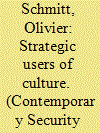

|
|
|
|
|
| Publication |
2012.
|
| Summary/Abstract |
This article looks at cases in which political leaders have engaged in seemingly inconsistent behaviour and explores how they framed and justified their decisions. After showing that strategic culture is composed of different facets, I argue that when faced with conflicting pressures from the international environment and their own national constituencies, political leaders intentionally manipulate facets of their own strategic culture to legitimate a decision, made for contingent reasons, to participate (or not) in a military operation. I illustrate this argument by analysing in depth the decision-making process and public justifications of the German participation in the European and Security Defence Policy (ESDP) mission EUFOR Congo in 2006 and its refusal to militarily participate in a similar mission in Chad in 2007. This conception of strategic culture as both a constraint and a resource for policymakers reinforces our understanding of the boundaries of strategic culture's explanatory power, and provides an explanation of seemingly inconsistent foreign policy behaviours.
|
|
|
|
|
|
|
|
|
|
|
|
|
|
|
|
| 9 |
ID:
188249
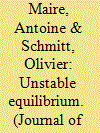

|
|
|
|
|
| Summary/Abstract |
French civil-military relations under the 5th Republic are marked by the imposing figure of the President, because of their role in nuclear deterrence. In that context, the role of the ministry of defence in general, and of its leader (the minister) in particular, is ambiguous: the minister is technically not the highest authority in charge of defence issues (since both the Prime Minister and the President are constitutionally tasked with important responsibilities in the defence realm), but they nevertheless need to find a role between the presidential guidelines and the military demands. In this article, we show that civil-military relations within the French ministry of Defence are therefore characterized by an “unstable equilibrium”: the history of the French MoD is rife with regular swings between the primacy of the military or the primacy of civilians. Overall, the French MoD has adopted a model civil-military relations which is structurally unstable, due to the shifting legitimacy of the military elite within the French bureaucracy and the importance of the personality of the political and military actors involved: without fundamentally altering bureaucratic rules and organization, the power balance between civilian and military actors can quickly evolve. To a degree, this shows the plasticity of French civil-military relations and its ability to adapt to the actors involved, especially the President.
|
|
|
|
|
|
|
|
|
|
|
|
|
|
|
|
| 10 |
ID:
171197
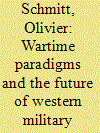

|
|
|
|
|
| Summary/Abstract |
From the perception of the imminence of threats at the political level to the seizing of initiative through proper timing at the tactical level, temporality is directly related to war and warfare. Yet, despite some analyses of the importance of time at the political/grand strategic level (usually by scholars) and at the tactical level (usually by military professionals) there is surprisingly little discussion of the impact of time on the preparation and the conduct of warfare. This article introduces the concept of ‘wartime paradigm’ as a heuristic device to understand the relationship between the perception of time and the conduct of warfare, and argues that after the Cold War, a specific ‘wartime paradigm’ combining an optimization for speed and an understanding of war as risk management has guided western warfare, from force structure to the conduct of actual operations. It shows how the changing character of warfare directly challenges this wartime paradigm and why, if western forces want to prevail in future conflicts, the establishment of a new wartime paradigm guiding technological improvements and operational concepts is critical.
|
|
|
|
|
|
|
|
|
|
|
|
|
|
|
|
| 11 |
ID:
160732
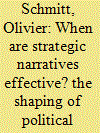

|
|
|
|
|
| Summary/Abstract |
Most research on strategic narratives has explored their creation, and their interaction with other elements of national power in the conduct of foreign policy. Yet, the issue of how the targeted political communities receive those strategic narratives, and thus how those narratives are likely to have a political impact, is understudied. This article argues that in order to understand the ways strategic narrative are received within a political community, political myths must be taken into account. It introduces a typology of political myths based on their degree of universality and their degree of coherence with other myths, and shows how those factors influence the reception of strategic narratives. These mechanisms are illustrated through a study of the reception of the Russian strategic narrative in France. This approach offers opportunities to assess the differentiated impact strategic narratives have on political communities.
|
|
|
|
|
|
|
|
|
|
|
|
|
|
|
|
|
|
|
|
|